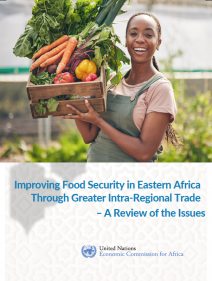This new report offers a critical analysis of the food security challenges confronting Eastern Africa and champions enhanced intra-African trade as a pathway towards greater resilience.
The report begins by discussing the impact of climate change on Eastern Africa agriculture, noting that rising temperatures and erratic rainfall have led to declining productivity and increased food shortages. Despite the region's agricultural potential, one in five people remain chronically undernourished. It emphasizes the importance of climate-smart agricultural practices and investments in irrigation and soil conservation to mitigate these impacts.
The report examines changes in global food production and trade patterns, highlighting concerns about Africa's food security. While Africa's food trade deficit is significant, it is often misreported. The report emphasizes the need for a detailed analysis of food import dependence, revealing that most of the deficits are concentrated in a few North African countries. On a per capita basis, Africa's food import dependence is about half that of Asia. While certain Eastern African nations face considerable hurdles in financing food imports, the region's collective food trade import deficit is relatively small, representing a mere 0.3% of its total GDP.
The report underscores the potential of the region's agricultural sector, which remains underdeveloped despite its vast resources. It calls for more investment in agriculture, better regional coordination, and the removal of trade barriers to boost intra-African trade. It also highlights the role of existing regional trade agreements and the potential of the African Continental Free Trade Area (AfCFTA) in boosting intra-African agricultural trade.
While acknowledging that intra-regional trade is not a panacea, the report argues that it presents substantial opportunities to significantly enhance agricultural productivity and foster the development of more robust and resilient food systems throughout Eastern Africa. It stresses the need for increased investment in agricultural research and development (R&D) to improve productivity and reduce poverty. The report also identifies key barriers such as high tariffs, non-tariff measures, and underinvestment in agriculture that need to be addressed to enhance intra-African trade.
Ultimately, this report is an indispensable resource for understanding the multifaceted complexities of food insecurity in the region.
Share this:
Release Date:
19 May, 2025
© United Nations Economic Commission for Africa

